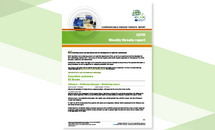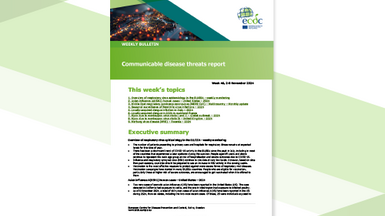Communicable disease threats report, 31 July - 6 August 2016, week 31
The Communicable Disease Threat Report (CDTR) is a weekly bulletin for epidemiologists and health professionals on active public health threats. This issues covers the period 31 July - 6 August 2016 and includes updates on Zika virus, yellow fever in Angola, chikungunya, dengue, West Nile virus and polio.
Executive Summary
This issue covers the period 31 July to 6 August 2016 and includes updates on a meningitis case during World Youth Day, West Nile virus, Zika virus infection and yellow fever outbreak.
Meningitis case related to a mass gathering event - World Youth Day - Poland – 2016
On 2 August, a fatal case of meningitis was reported in a 19-year-old Italian citizen who attended World Youth Day in Krakow, Poland, from 26 to 31 July 2016. More than three million people were gathered at this event.
West Nile virus
As of 28 July, the National Reference Centre for Exotic Diseases (CESME) in Italy reported that five pools of mosquitoes were positive for West Nile virus in Sardinia, Lombardy and Emilia Romagna.
During the June to November transmission season, West Nile fever cases in humans are shown in ECDC’s weekly updated West Nile fever maps. This informs blood safety authorities of West Nile fever (WNF)-affected areas and enables them to identify significant changes in the epidemiology of the disease.
Zika virus infection
On 1 August, the Florida Department of Health in the United States confirmed four autochthonous Zika virus cases infected by local mosquitoes in Miami-Dade and Broward counties. As of 4 August, the Florida Department of Health (DOH) had identified, in total, 15 locally acquired Zika cases in Florida who likely acquired the infection through a mosquito bite. The DOH believes that active transmission of the Zika virus is still only occurring in one small area of Miami-Dade County. Among the 15 cases, six are asymptomatic and were identified as a result of the door-to-door community survey that the DOH is conducting.
The US CDC has issued travel advice for people who live in or travelled to Wynwood in Miami any time after 15 June. Pregnant women have been advised not to travel to this neighbourhood.
In addition, the US CDC has published an official health advisory on guidance for 'Travel and Testing of Pregnant Women and Women of Reproductive Age for Zika Virus Infection Related to the Investigation for Local Mosquito-borne Zika Virus Transmission in Miami-Dade and Broward Counties, Florida'. The CDC is also recommending Zika testing for all pregnant women in the continental United States at prenatal visits in their first and second trimesters.
On 3 August, the Ministry of Health in Cuba reported two cases of locally acquired Zika in the city of Hoguin.
In Vietnam, the Ministry of Health reported one case of locally acquired Zika virus in Phu Yen Province.
Since 1 February 2016, Zika virus infection and the related clusters of microcephaly cases and other neurological disorders constitute a public health emergency of international concern (PHEIC). Since 2015, and as of 4 August 2016, WHO has reported 65 countries and territories with mosquito-borne transmission.
ECDC publishes an epidemiological update every Friday together with maps with information on countries or territories which have reported confirmed autochthonous cases of Zika virus infection. A Zika virus infection Atlasis also available.
Yellow fever outbreak
As of week 30, the number of suspected and confirmed cases continues to decline in Angola. According to WHO, as of 27 July there were 2 051 suspected cases and 76 confirmed cases, including 95 deaths, reported in the Democratic Republic of Congo.
An outbreak of yellow fever in Angola started in December 2015 in the municipality of Viana, Luanda province, and has spread to all 18 provinces of Angola.
Download






